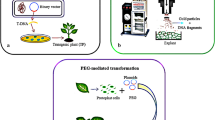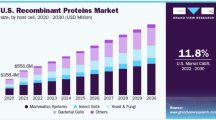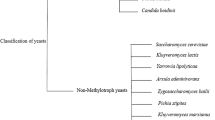Abstract
Expression of recombinant proteins in Escherichia coli often requires use of inducible promoters to shorten the lag phase and improve protein productivity and final protein titer. Synthetic molecules that cannot be metabolized by E. coli, such as isopropyl thiogalactopyranoside (IPTG), have been frequently used to trigger the protein expression during early exponential growth phase. This practice has many drawbacks, including high cost and toxicity of IPTG, complex operating procedure, and non-uniform protein expression pattern (some cells in the population do not express recombinant proteins). A few auto-inducible protein expression systems have been developed recently to overcome some of these limitations, but they required use of an additional plasmid or presence of large (a few kilobases) DNA part to be functional, making plasmid construction to be difficult, especially when multiple genes need to be expressed. In this study, by using RNA sequencing, we identified a short, endogenous promoter (PthrC) that can be auto-induced during early exponential growth phase, and improved its performance by use of native and mutated regulatory elements. We found that the developed mutants of PthrC drove uniform protein expression—close to 100% of cells were fluorescent when green fluorescence protein was used as target protein—and cells carrying them could achieve much higher cell density than those with T7 promoter (PT7), a commonly used inducible promoter. In terms of promoter strength (product protein quantity per cell), the developed promoter mutants can cover a range of strength, from 30 to 150% of maximal strength of PT7. One strong mutant (PthrC3_8) was found to work well at a large range of temperature (22, 30, 37 °C) and in various media, and was also confirmed to cause less stress to host cell than PT7 when they were used to express a toxic protein. We foresee that PthrC3 and its mutants will be useful genetic parts for various applications including metabolic engineering and biocatalysis.






Similar content being viewed by others
References
Alper H, Fischer C, Nevoigt E, Stephanopoulos G (2005) Tuning genetic control through promoter engineering. Proc Natl Acad Sci 102:12678–12683. https://doi.org/10.1073/pnas.0504604102
Amann E, Brosius J (1985) ATG vectors’ for regulated high-level expression of cloned genes in Escherichia coli. Gene 40:183–190. https://doi.org/10.1016/0378-1119(85)90041-1
Briand L, Marcion G, Kriznik A, Heydel JM, Artur Y, Garrido C, Seigneuric R, Neiers F (2016) A self-inducible heterologous protein expression system in Escherichia coli. Sci Rep 6:1–11. https://doi.org/10.1038/srep33037
de Boer HA, Comstock LJ, Vasser M (1983) The tac promoter: a functional hybrid derived from the trp and lac promoters. Proc Natl Acad Sci 80:21–25. https://doi.org/10.1073/pnas.80.1.21
Gardner J (1979) Regulation of the threonine operon: tandem threonine and isoleucine codons in the control region and translational control of transcription termination. Proc Natl Acad Sci 76:1706–1710. https://doi.org/10.1073/pnas.76.4.1706
Gardner JF (1982) Initiation, pausing, and termination of transcription in the threonine operon regulatory region of Escherichia coli. J Biol Chem 257:3896–3904
Guzman L-M, Belin D, Carson MJ, Beckwith J (1995) Tight regulation, modulation, and high-level expression by vectors containing the arabinose PBAD promoter. J Bacteriol 177:4121–4130. https://doi.org/10.1128/jb.177.14.4121-4130
Hansen LH, Knudsen S, Sørensen SJ (1998) The effect of the lacY gene on the induction of IPTG inducible promoters, studied in Escherichia Coli and Pseudomonas fluorescens. Curr Microbiol 36:341–347. https://doi.org/10.1007/s002849900320
Khlebnikov A, Keasling JD (2002) Effect of lacY expression on homogeneity of induction from the Ptac and Ptrc promoters by natural and synthetic inducers. Biotechnol Prog 18:672–674. https://doi.org/10.1021/bp010141k
Liang C, Xiong D, Zhang Y, Mu S, Tang SY (2015) Development of a novel uric-acid-responsive regulatory system in Escherichia coli. Appl Microbiol Biotechnol 99:2267–2275. https://doi.org/10.1007/s00253-014-6290-6
Nocadello S, Swennen EF (2012) The new pLAI (lux regulon based auto-inducible) expression system for recombinant protein production in Escherichia coli. Microb Cell Factories 11:1–10. https://doi.org/10.1186/1475-2859-11-3
Qoronfleh MW, Debouck C, Keller J (1992) Identification and characterization of novel low-temperature-inducible promoters of Escherichia coli. J Bacteriol 174:7902–7909. https://doi.org/10.1128/jb.174.24.7902-7909.1992
Skerra A (1994) Use of the tetracycline promoter for the tightly regulated production of a murine antibody fragment in Escherichia coli. Gene 151:131–135. https://doi.org/10.1016/0378-1119(94)90643-2
Zhou K, Zou R, Stephanopoulos G, Too HP (2012) Metabolite profiling identified methylerythritol cyclodiphosphate efflux as a limiting step in microbial isoprenoid production. PLoS One 7:e47513. https://doi.org/10.1371/journal.pone.0047513
Funding
This was funded by National University of Singapore Start-up Grant (R-279-000-452-133) and Ministry of Education Tier 1 Grants (R-279-000-478-112 and R-279-000-494-114). The study was done at the National University of Singapore.
Author information
Authors and Affiliations
Contributions
O.A. was an undergraduate student at Kingston University London and worked on this project during her research attachment at the National University of Singapore. O.A., H.L., and K.Z. conceived the project and designed the experiments. O.A., H.L., and X.Q.M. did the experiments. L.M.Y. supervised execution of some experiments and maintained many critical instruments for this project. O.A., H.L., and K.Z. analyzed the data and wrote the manuscript. All the authors have read the final version of this manuscript.
Corresponding author
Ethics declarations
Conflict of interest
The authors declare that they have no conflict of interest.
Informed consent
This article does not contain any studies with human participants or animals performed by any of the authors.
Electronic supplementary material
ESM 1
(PDF 4641 kb)
Rights and permissions
About this article
Cite this article
Anilionyte, O., Liang, H., Ma, X. et al. Short, auto-inducible promoters for well-controlled protein expression in Escherichia coli. Appl Microbiol Biotechnol 102, 7007–7015 (2018). https://doi.org/10.1007/s00253-018-9141-z
Received:
Revised:
Accepted:
Published:
Issue Date:
DOI: https://doi.org/10.1007/s00253-018-9141-z




